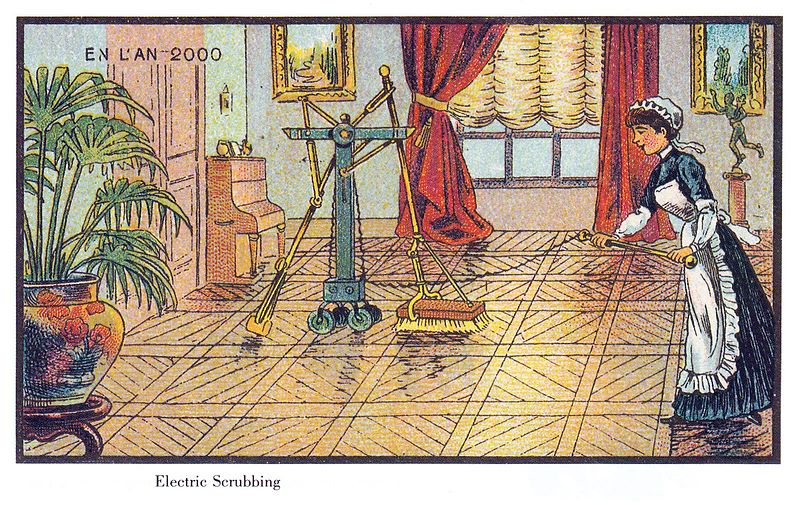 In the 19th century, Oscar Wilde famously stated, "We live, I regret to say, in an age of surfaces." - generating pollution, unwanted microorganisms and allergens. As automation becomes increasingly prevalent in our lives, it's easy to wonder why some maintenance tasks are still performed by human workers. Despite the proliferation of "smart" technologies, many of the futuristic features we were promised in model homes and prototypes have yet to become a reality. From 3D printers for disposable dinner plates to virtual girlfriends that can cook and clean, it seems that we are still waiting for the advanced home technologies predicted in science-fiction. In the past, we have seen many interesting ideas such as Frances Gabe's self-cleaning home in Oregon and the rounded corners proposed by Buckminster Fuller and Peter and Alison Smithson to improve cleaning.
In the 19th century, Oscar Wilde famously stated, "We live, I regret to say, in an age of surfaces." - generating pollution, unwanted microorganisms and allergens. As automation becomes increasingly prevalent in our lives, it's easy to wonder why some maintenance tasks are still performed by human workers. Despite the proliferation of "smart" technologies, many of the futuristic features we were promised in model homes and prototypes have yet to become a reality. From 3D printers for disposable dinner plates to virtual girlfriends that can cook and clean, it seems that we are still waiting for the advanced home technologies predicted in science-fiction. In the past, we have seen many interesting ideas such as Frances Gabe's self-cleaning home in Oregon and the rounded corners proposed by Buckminster Fuller and Peter and Alison Smithson to improve cleaning. Frances Gabe, known for her innovative approach to housework in the 1980s, wanted to make housework extinct. As a busy mother of two, she grew tired of the never-ending cycle of cleaning and built a self-cleaning house that used sprinklers and drying machines to channel water into drains that led outside.
Gabe received a lot of attention and notoriety during the heyday of her self-cleaning house, but later faded from the public eye. She was known to be a bit of a recluse and had a reputation for being "difficult," according to some friends and neighbors. Despite her innovative approach to housework, Gabe's life ended rather anonymously, having divorced and outlived her two children.
Unfortunately, an earthquake in 2001 severely damaged the technology in the self-cleaning house and it is now used as a "wintering habitat for honeybee colonies and campground for traveling cyclists" by its current owner.
While Gabe's self-cleaning house may have been ahead of its time, today we are seeing more and more innovations in home cleaning technology, such as automatic vacuum cleaners and self-cleaning toilets. The latter technology can reduce the risk of cross-contamination and the need for harsh chemicals.
But while some fictional homes, like those in Back to the Future and Blade Runner, have been able to incorporate robots and automated features to assist with tasks like feeding pets and preparing meals, it seems that we are still far from achieving a truly self-sufficient home.
Perhaps the closest we have come to realizing some of these futuristic home technologies is through the use of smart home assistants, like speakers that can turn on lights or set up a virtual card table for a weekly game of bridge. While these technologies are certainly convenient, they are still a far cry from the kind of self-sustaining homes that we were promised in the past.
As Sigmund Freud suggested, our jokes often reveal our unconscious desires, and this may explain why the idea of a self-cleaning car was such a hit when Subaru introduced it as an April Fool's joke in 2013. The "Carbon electric paint" technology was supposed to use ambient air and a surge of electricity to clean the car's exterior. It seemed that people wanted the self-cleaning feature even more than self-driving.
According to a survey conducted by the American Cleaning Institute in 2018, the average American spends approximately six hours per week cleaning their home, with over a quarter of respondents spending over seven hours straightening up. Despite this effort, many of us still wonder if we are cleaning enough and if we are doing it correctly. Our most regularly cleaned fixtures are toilets and floors, and our most dreaded cleaning tasks are typically cleaning the bathroom, followed by kitchen cleaning, dusting, mopping, and doing the laundry.
 |
| Future envisioned in 1899 |
As technology continues to advance, it is likely that we will see "smarter" or even "living" houses. Researchers are working on developing robots that can perform tasks like laundry and dishwashing, and there are even companies exploring the use of drones for tasks like roof inspections and window cleaning. It will be interesting to see how these technologies evolve and how they can be used to make our lives easier in the future. Maybe one day we'll even be able to leave behind no-longer needed cleaning tools for good.
================================
IG: Special thanks to OpenAI's Assistant for their help with organizing my old notes and writing this article.